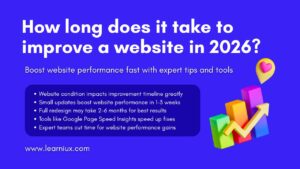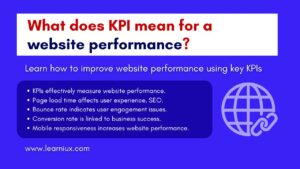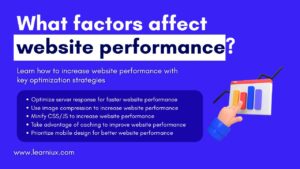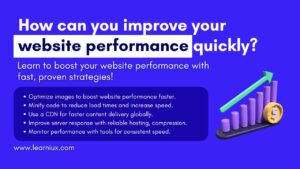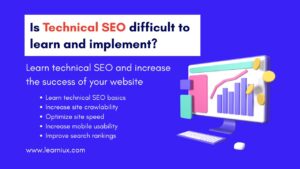Off-page SEO plays a key role in increasing your website’s authority and improving its ranking on search engines. Unlike on-page SEO, which focuses on optimizing elements within your website, off-page SEO revolves around external factors like backlinks, social media signals, and brand mentions. These external signals help search engines gauge your site’s credibility and relevance in the digital ecosystem. Measuring the performance of your off-page SEO efforts is crucial to understanding how well your strategies are working and where improvements are needed. By consistently monitoring key metrics, you can refine your approach and stay in tune with evolving algorithms and drive sustainable traffic growth. This comprehensive guide explores actionable ways to assess the effectiveness of your off-page SEO so you can maximize its impact without relying on old tricks.
To start evaluating your off-page SEO, you need to understand why you need to track its performance. The digital landscape is highly competitive, and search engines like Google rely on external signals to determine a website’s credibility. Off-page SEO directly impacts how authoritative your site appears. By analyzing the right metrics, you can identify which strategies are delivering results and which ones need adjusting. For example, a strong backlink profile can significantly boost your rankings, while poor quality links can damage your site’s reputation. Monitoring off-page SEO can help you stay ahead of your competitors by finding new opportunities for link building and audience engagement. Without regular evaluation, you can waste resources on ineffective tactics or miss gaps in your strategy that can hinder growth.
One of the most important aspects of off-page SEO is your backlink profile. Backlinks are links from external websites that point to your site, and they act as a vote of trust in the eyes of search engines. Start by analyzing the quantity and quality of your backlinks to assess the performance of your off-page SEO. Tools like Ahrefs SEMrush or Moz can provide detailed insights into your backlink profile. Check the total number of backlinks and monitor their growth over time. A steady increase in backlinks indicates that your off-page SEO efforts are gaining traction. However, quantity alone is not enough. The quality of backlinks is more important than numbers. Focus on links from high-authority domains as they carry more weight in improving your off-page SEO. Domain Authority or DA is a metric that indicates the strength of a website that contributes more to your rankings.
Another important factor in backlink analysis is anchor text diversity. Anchor text is the clickable text in a hyperlink and is used by search engines to understand the context of the linked page. Overoptimized anchor text that repeatedly uses the same keywords can be penalized for appearing manipulative. Make sure your anchor text is varied and relevant to maintain a natural off-page SEO profile. Also track the number of unique referring domains linking to your site. A diverse range of referring domains strengthens your off-page SEO because it signals to search engines that multiple reputable sources trust your content. Regularly auditing your backlink profile can help you identify low-quality or toxic links that could be hurting your rankings. If you find spammy links, use Google’s disavow tool to minimize their impact on your off-page SEO performance.
Referral traffic is another important metric for evaluating off-page SEO. It refers to visitors coming to your website from external sources such as backlinks, social media platforms, or online mentions. Google Analytics is a great tool for tracking referral traffic. You can determine the effectiveness of your off-page SEO campaigns by analyzing which domains are driving the most traffic. For example, if a guest post on a high-authority blog sends significant traffic to your site, that indicates a successful off-page SEO tactic. Similarly, low traffic from certain sources may indicate that those links or platforms are not a good match for your audience. Dig deeper into the data to identify which pages on your site receive the most referral traffic. This information allows you to replicate successful off-page SEO strategies and focus on building links that drive meaningful engagement.
Social media engagement is another important component of off-page SEO. Social signals like likes, shares, and comments may not directly impact search engine rankings, but they do contribute to brand visibility and audience reach. Tools like BuzzSumo or Hootsuite can help you track how often your content is shared on platforms like Twitter, Facebook, or LinkedIn. High engagement levels indicate that your content resonates with your audience, which can indirectly boost your off-page SEO by driving traffic and encouraging natural backlinks. For example, viral social media posts can lead to bloggers or websites linking to your content, which can further boost your off-page SEO. Monitor metrics like share volume, audience comments, and follower growth to measure the impact of your social media efforts. Use these insights to create more shareable content that aligns with your off-page SEO goals.
Brand mentions also play a crucial role in off-page SEO. Even if the mention is not linked, it still signals to search engines that your brand is relevant and trustworthy. Tools like Mentions or Google Alerts can help you track where your brand is mentioned online, such as on blog forums, news sites, or social media. Unlinked mentions provide an opportunity to strengthen your off-page SEO by reaching out to site owners and requesting a link. For example, if a blog mentions your brand but doesn’t link to your website, a polite email can turn that mention into a valuable backlink. Regularly monitoring brand mentions will ensure you don’t miss out on opportunities to boost your off-page SEO while also keeping an eye on your online reputation.
Several tools can simplify the process of measuring off-page SEO performance. Ahrefs is a powerful tool for backlink analysis that provides detailed reports on referring domain anchor text and link quality. Its competitor analysis feature also allows you to study the off-page SEO strategies of the top ranking websites in your niche. SEMrush is another versatile tool that provides insights into backlink referral traffic and brand mentions. Its brand monitoring feature tracks mentions across the web to help you identify opportunities for link building. Google Analytics is essential for tracking referral traffic and understanding how users interact with your site from external sources. Set up custom reports to specifically focus on off-page SEO metrics, such as backlinks or social media traffic. Moz’s Link Explorer is another valuable tool for assessing domain authority and identifying spammy links that could be hurting your off-page SEO. By combining these tools, you can get a comprehensive view of your off-page SEO performance and make data-driven decisions.
Take a structured approach to effectively assessing and improving your off-page SEO. Start by conducting a full backlink audit to identify and remove toxic links. Use tools like Ahrefs or Moz to flag low-quality links and disavow them if necessary. Next, analyze your competitors’ off-page SEO strategies. Look at their backlink profiles to identify high-authority sites that link to them. This can reveal opportunities for guest posting content collaborations or outreach campaigns that boost your off-page SEO. Monitoring social signals is equally important. Track engagement metrics to understand what types of content resonate with your audience. For example, if infographics work well on social media, create more visual content to boost your off-page SEO. Additionally, monitor your search engine rankings using tools like Google Search Console or Semrush. Improvements in keyword rankings often reflect the success of your off-page SEO efforts. Finally, improve your link building strategies by focusing on acquiring high-quality backlinks from reputable sites. Guest posting, thought leadership articles, and partnering with industry influencers are all effective ways to strengthen your off-page SEO.
When measuring off-page SEO performance, it’s crucial to avoid common mistakes that can undermine your efforts. One big risk is ignoring low-quality links. Toxic backlinks from spammy or irrelevant sites can hurt your rankings and negate your off-page SEO efforts. Regular audits can help you stay on top of this issue. Another mistake is ignoring the role of social media in off-page SEO. While social signals may not directly impact rankings, they do increase the reach of your content and attract natural backlinks. Another mistake to avoid is focusing solely on the number of backlinks. A few high-quality links from authoritative sites are far more valuable than numerous low-quality links. Prioritizing quality ensures that your off-page SEO delivers long-term results.
Staying up-to-date with off-page SEO trends is essential in a rapidly evolving digital landscape. Search engine algorithms change frequently, and what works today may be less effective tomorrow. Follow reputable industry blogs like Search Engine Journal Moj Blog or Ahrefs Blog to stay informed about the latest off-page SEO techniques. Joining online communities on platforms like Reddit, LinkedIn, or Twitter can also provide valuable insights from other SEO professionals. Join discussions, attend webinars, or participate in forums to learn about emerging strategies that can enhance your off-page SEO. For example, voice search optimization and AI-driven content strategies are becoming increasingly relevant, and understanding their impact on off-page SEO can give you a competitive edge.
Another important aspect of off-page SEO is understanding the role of user-generated content. Review ratings and comments on platforms like Google My Business, Yelp, or Trustpilot can influence your site’s credibility. Positive reviews signal trustworthiness to users and search engines, which contributes to your off-page SEO. Encourage satisfied customers to leave reviews and respond promptly to feedback to build a strong online reputation. You can also boost your off-page SEO by participating in online forums or Q&A platforms like Quora. By providing valuable answers and linking back to your website, you can increase traffic and establish authority in your niche. Make sure your contributions are genuine and relevant to increase their impact on off-page SEO.
Local SEO is another area where off-page SEO plays a crucial role, especially for businesses that target specific geographic areas. Creating citations that mention your business name, address, and phone number in directories like Yelp Yellow Pages or Google My Business strengthens your off-page SEO. Make sure your citations are consistent across all platforms to avoid confusion and improve local search rankings. Interacting with local communities through sponsorship programs or partnerships can also generate valuable backlinks and mentions that can boost your off-page SEO performance.
Consider leveraging content marketing strategies to further optimize your off-page SEO. Creating high-quality, shareable content like infographics, videos, or in-depth guides encourages other websites to link to your site. For example, a well-researched industry report can attract backlinks from blog news outlets and influencers, which boosts your off-page SEO. Increase the reach of this content by promoting it through social media email outreach and partnerships. Collaborating with influencers in your niche is another effective off-page SEO tactic. Influencers with large followings can amplify your content and drive traffic to your site, increasing both referral traffic and backlink opportunities.
Measuring your off-page SEO performance requires a long-term commitment. Unlike on-page SEO, where changes can yield quick results, off-page SEO often takes time to show measurable results. Be patient in tracking metrics and improving your strategies, but be consistent. Set realistic goals, such as increasing your referring domains by a certain percentage or increasing referral traffic over a specific period of time. Regularly review your progress using the tools and metrics discussed earlier to ensure that your off-page SEO efforts are on track. If some tactics aren’t working, try new approaches, such as targeting different platforms or experimenting with new content formats.
Another advanced technique for evaluating off-page SEO is analyzing your site’s share of voice. Share of voice measures the proportion of online conversations your brand has in your niche compared to your competitors. Tools like BrandWatch or Sprout Social can help you track this metric by analyzing social engagement and content reach. A high share of voice indicates that your off-page SEO is successfully building brand authority and visibility. Use this data to identify gaps in your strategy and focus on areas where your competitors are outperforming you.
Revisit your goals and metrics regularly to ensure your off-page SEO remains effective. For example, if your referral traffic isn’t growing as expected, reevaluate the quality of your backlinks or explore new platforms for content promotion. Similarly, if your social media engagement is low, experiment with different content types or posting schedules to better connect with your audience. Off-page SEO is not a one-time task, but an ongoing process that requires adaptability and persistence. By being proactive and data-driven, you can continually improve your off-page SEO performance.
Finally, measuring the performance of your off-page SEO is essential to building a strong and authoritative online presence. By focusing on key metrics like backlinks, referral traffic, social signals, and brand mentions, you can gain valuable insights into the effectiveness of your strategies. Use tools like Ahrefs SEMrush, Google Analytics, and Moz to track these metrics and identify opportunities for improvement. Follow a structured approach to audit backlinks, analyze competitors, monitor social engagement, and improve your link building strategy. Avoid common mistakes like ignoring toxic links or focusing solely on link volume. Stay up to date with industry trends, interact with online communities, and leverage content marketing to grow your off-page SEO. Consistent monitoring and optimization of your off-page SEO efforts will drive sustainable traffic boosts, search engine rankings, and establish your brand as a trusted authority in your field. Start implementing these strategies today to unlock the full potential of your off-page SEO and achieve long-term success in the digital landscape.






















